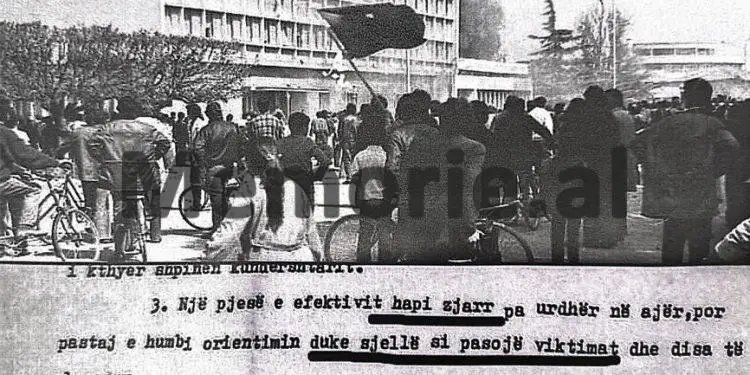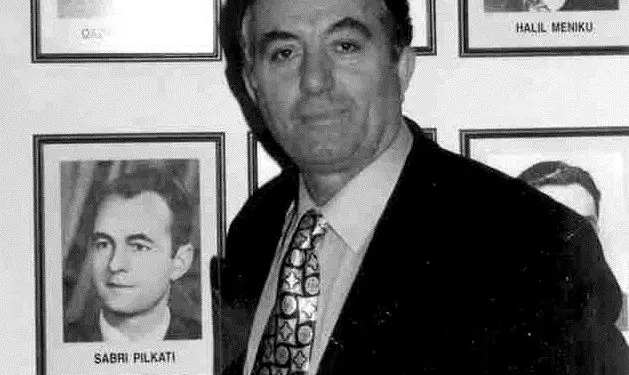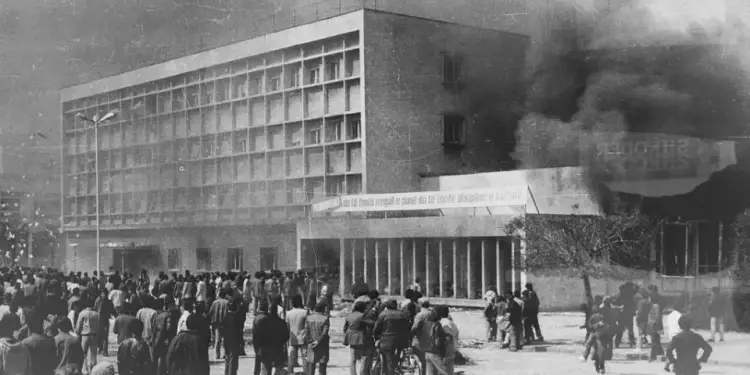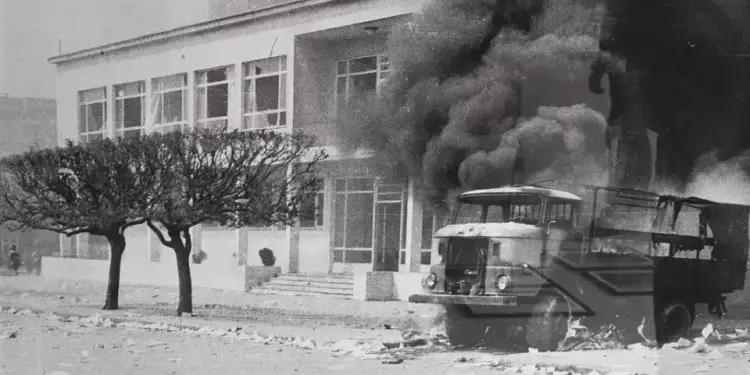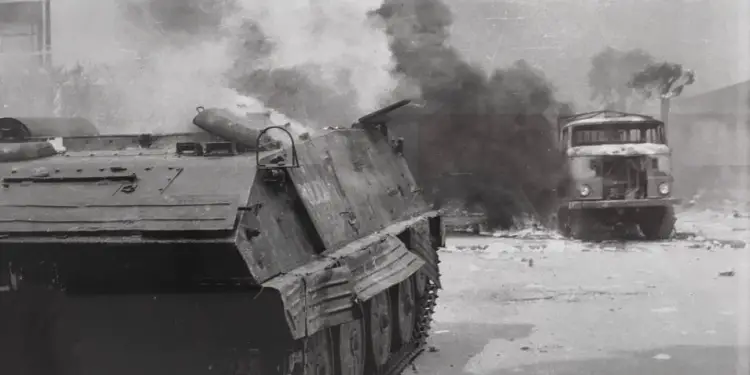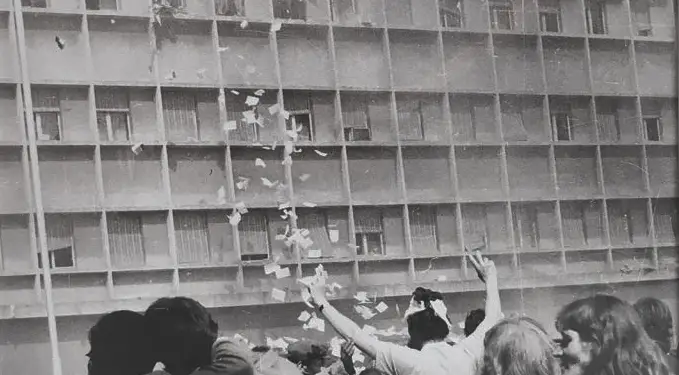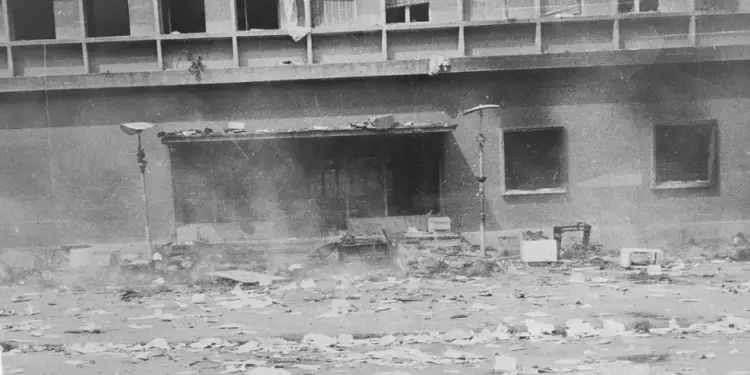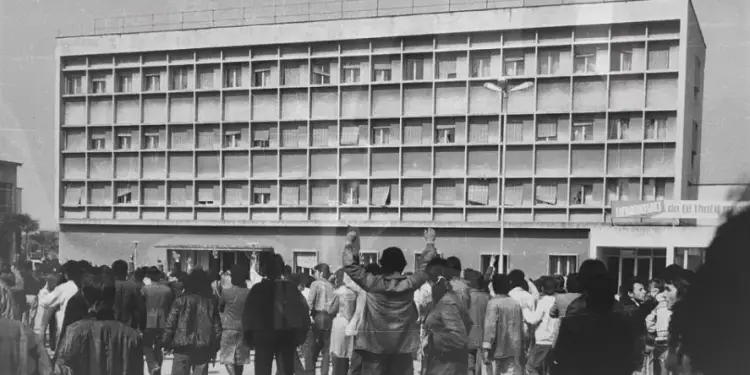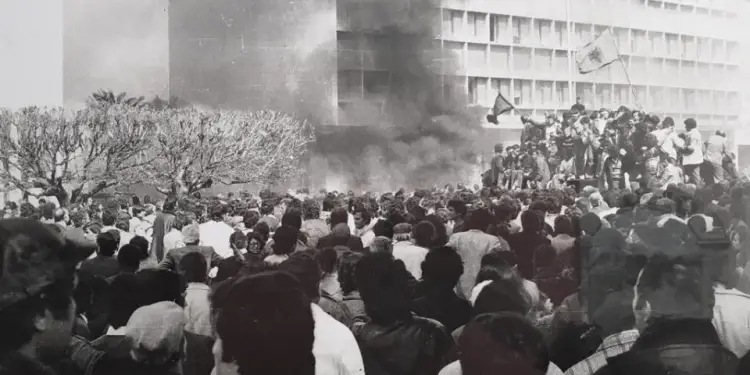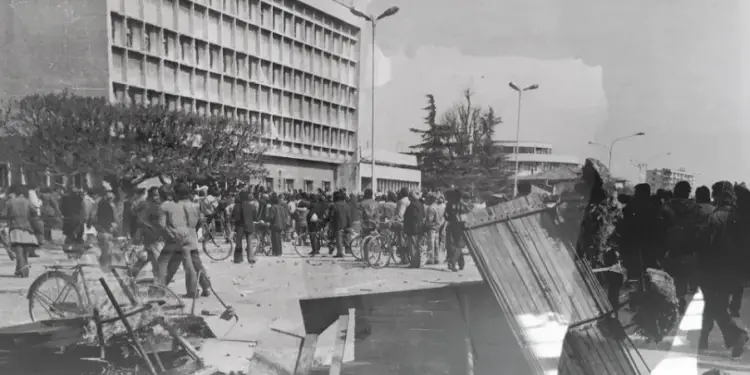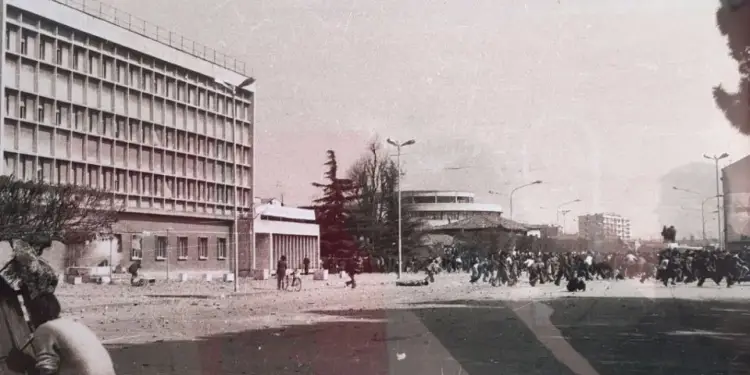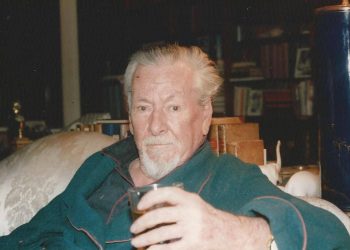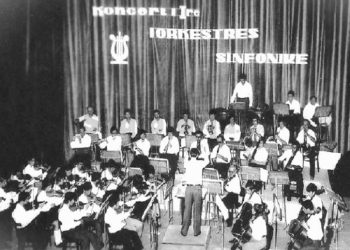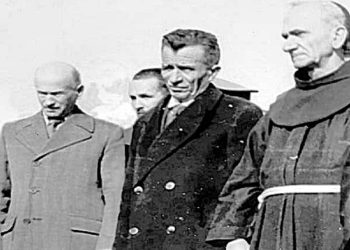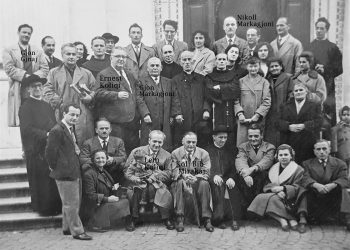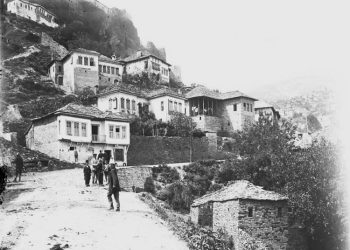By Tanush Mulleti
The first part
Reflections: “How I saw it, heard it and touched it on April 2, 1991, and how I hear it today”!
Memorie.al / April 2, 1991, has entered the history of Albania and is accepted even today by all wings of politics, as a monstrous and macabre crime, where 4 young boys were killed and over 97 people were injured, some of who remained disabled for life, all young men and women (as Umberto Eço says: “The truth and only the truth will save us”). The reason for writing these reflections is that we are hearing and reading, intentionally or unintentionally, the history of the event of April 2, 1991. For these notes, I was not driven by hatred, nor revenge, nor ambition, nor interest, but only conscience to tell the truth, publicly, as it happened.
How did the event begin…?!
On March 31, 1991, it was the first pluralist election since 1945 that was allowed and accepted to be held by the Labor Party (formerly the Communist Party). Under the pressure of the ‘Anti-Communist Movement of January 14, 1991’, developed in Shkodër, the removal of Stalin’s bust, the ‘Kavaja Protests’, the ‘Student Movement’ and the acceptance of party pluralism, later we have ‘December 13, 1990’, the removal of the bust of Enver Hoxha in Shkodër, etc. Despite the short time for the preparation of the elections, the opinion was strengthened in Shkodër that the defeat of communism was indisputable.
The morning of April 1st, 1991, found me with Besnik Komi, a member of the Voting Commission in Shkodra district, where we were informed that the result was the complete loss of the Labor Party, which had won with only 3 deputies, while the Party Democratic, full of 16 deputies. This result, also due to the fact that the district of Shkodra, for reasons and circumstances that are already known, was absolutely right-wing. Incidentally, we heard that RAI’s correspondent from Tirana, at 7 am, informed that the Labor Party won 62% of the votes. For the mass opinion of Shkodra, this was unbelievable!
The election result, RAI, repeated several times in its news. This made a part of the people gather in front of the Shkodra Democratic Party branch headquarters, at the former Atheist Museum, and there they asked for accurate information. At this time, on the second floor of that building, a DP activist, Eduart Përjaku, came out, but people insisted that the leaders of the DP come out. After waiting for a while, the secretary of the PD branch, Xhemal Uruçi, came, but they did not accept this man either. After an hour, in one of the windows of the second floor, Azem Hajdari appeared who had been the winning deputy in Shkoder and had slept in Shkoder on the night of the elections. Azemi began to show that the Democratic Party of Albania had won in cities across the country and the result was accepted.
The public began to doubt, saying: “When did they count these so quickly”, knowing the backward infrastructure of that time. Then, the clash of people started in conversation and debates, confronting you, Azem Hajdar: “Does everyone know that the victory of the communists?! They will start with arrests, as they did on January 14, 1990, in the demonstration for the removal of the bust of Stalin) and December 13, 1990, for the removal of the bust of Enver Hoxha in front of the Executive Committee, where there was no employee in the office, around 14:00-15:00”.
In these debates with Azem Hajdar, who spoke from the second floor, without a microphone, people were not convinced and doubtless left dissatisfied. Fifty meters away from this place, where Stalin’s bust had been, was Dede Kasneci, who had been released from prison a few days before, one of the main protagonists for the removal of Stalin’s bust, sentenced to twelve years in prison.
Then the crowd that was there started chanting against communism, surrounding Deda and throwing him up and chanting “Long live Deda”! “Down with Communism”, “Enver Hitler”! “Freedom Democracy”, etc. The crowd swelled and multiplied, heading towards the district Party Committee building. From 11:00 in the morning, until 23:00, in the late evening, the people who had come to the square did not move from there, sitting down, the whole day of April 1.
At 11:00 p.m. late in the evening, together with my wife, Safeti, I was at the door of the lecture hall of the Party Committee, where Eduard Përjaku, from the DP branch, as well as the Police Chief of the Interior Branch, called us, to end the protest and come tomorrow. After this call, the people dispersed. April 2 found me at work. As soon as we started work, at around 8:00, the drums of the guns were heard. Then we left work, hurried each of us running, went to the children in the schools.
The truth was that the students of the “Jordan Misja” high school had called on the high school students of “November 29” (today “November 28”) to protest. From the information we had, it was said that the Police had received orders to attack all possible gatherings from the beginning. Thus, as soon as the protesters gathered, the Police intervened and responded with rubber batons, and later with guns.
This marked the beginning of the clash between the revolted people and the police forces. Four people were killed and several others were injured. The police received reinforcements and pushed back the crowd, two or three times. This thing seemed somewhat unexpected, since the day before, the Police had behaved peacefully with the protesters and there was no incident with the police forces!
During this time, the news circulated that; was overturned Central Committee of the Party of Labor of Albania in Tirana, they arrested Ramiz Alina, Xhelil Gjoni was put in charge of the Party of Labor. The police brought an armored vehicle (Diagaç) with ammunition, which broke down on the road, in front of “Kafe Rinia” in Parrucë neighborhood. Several crates of cartridges were scattered on the asphalt. Since Xhelil Gjoni belonged to Hysni Kapo’s clan, the people attacked and did not accept him. A part of the people, understandably, had faith in Ramiz Alia.
In the book “Memories, Saga of Traboinë”, Kolec Traboini, page 294, wrote: “I went to talk to the Chief of Police at the Party Committee and I said: What are you doing? The Central Committee has fallen and you will be killed in vain”?! Then the people entered the Party Committee. The police left the building by order and dispersed, having run out of ammunition. (Conversation with the Head of the Internal Branch, Çapajev Taçi with Gjek Çela, page 87).
The building of the Party Committee burned down. After the Party Committee, the people turned to the city library, which had valuable books, and Shkodra intellectuals appealed to the people, saying that the library could not be burned because it has historical values. Then, the Director of the Library, Skender Beci, stopped the people and said: “I am taking the books of Enver Hoxha”. He took out two or three carts, with the works of Enver Hoxha, and the situation calmed down. Then, the good people went to the building of Radio-Shkodra.
On the way, I saw a couple of carts of Roma, who had stolen the furnishings of the Party Committee, such as; old armchairs, curtains, etc. The people stopped them in Parruca, turned them back, and they were thrown into the fire that had been lit at the Party Committee and burned there.
On April 2, during this time, going towards Radio Shkodra, (where today the April 2 monument is), we met the President of the Shkodra Trade Union, Ferdinand Temali, a brave, courageous and intelligent boy. He asked us to go and speak in front of Radio Shkodra, on behalf of the Syndicate that Radio-Shkodra must be preserved.
So, together with Besnik Komi, we went to the building of Radio Shkodra, where the people had gathered in front of it. The protest continued with calls against communism. At the door, there was a weak policeman, on the verge of retirement, who was vainly guarding the door from the inside because he had nothing to do. There I saw Paç Bilal, with a flag without a star and a cell on his head, waving it in the air as much as he could.
I spoke in front of the protesters, on behalf of the Union of Trade Unions of Shkodra, and we did not allow anyone to harm Radio-Shkodra.
There were also 7-8 soldiers who were dressed in blue uniforms, like those of the police. Those 19-year-old deserters were shaking with fear and we took them under protection. After that, we met with the director of Radio Shkodra, Gëzim Podgorica, and talked at the editor-in-chief’s table, insisting that we take out a microphone and speak to the people. For this, a technician helped us, his last name was Gajtani.
After connecting a few pieces of wire, we took the tripod microphone out to the balcony (radio access console) and started talking to the people who had gathered in front of the Radio-Shkodra building. During this time, people wanted to go to the Department of Internal Affairs to release political prisoners, most of who were arrested for past events, such as the protests of January 14, 1990 and December 13, 1990 to. Guns were no longer heard.
After 23.00, a gunshot was heard. I asked to speak with the Head of the Branch on the phone. An operative, in civilian clothes, brought me a hand-held radio receiver and I spoke directly to him. I advised him, telling him explicitly: “I am Tanush Mulleti, representative of the Independent Trade Unions.” You have to be very careful because the blood has heated up and if the people come to the Interior Branch, things will go very badly”!
He answered me: “He is a pensioner, an old veteran who shoots guns and that job was closed.” After that, we spoke personally with the deputy prime minister of that time, Shkëlqim Cani, to whom I explained the situation and asked them to be very careful that blood had heated up and there could be tragic consequences later, and they should not no arrests were made. He promised me that “December 13”, “January 14”, etc., when arrests were made at dinner, will not be repeated.
During this time, when we were talking to the people, around 12:00, Azem Hajdari came urgently from Tirana together with Blerim Çela, who was the deputies of Shkodra. We talked with them and told them that; they should have talked to the people about how Shkodra would be protected in the evening so that there would be no theft and destruction in the city and its surroundings.
In the same way, Besnik Komi says to them: “Do you know the people of Shkodra that now you are a deputy”. Azemi replied: “We want power with votes.” Blerimi said: “Here, there is not even three days of bread”! Then we said to them: “Speak to the people”. Azemi went to the balcony of Radio-Shkodra, through a window, to speak to the people, to the static microphone. During the speech, there was disagreement with the people, about the possibility of arresting the protesters, about the release of political prisoners in the Internal Branch and the destruction that could happen in the evening in the city.
Azemi, it was bad. When he entered the editor-in-chief’s office, he fainted. Besnik took a sip of water, washed his face and Azemi came to his senses and said: “It’s the second time I’m not getting along with the Shkodrans”! Ferit Lluja told him: “Mor Azem, the communists are treacherous. On January 14 they arrested about 300-400 people, on December 13 they arrested over 100 people”.
Meanwhile, in this situation, Besnik Komi says: “We have nothing more to do here! These are MPs, even if they appear as gods to the people”! Together with Besnik and Ferit Lluja, we left Radio-Shkodra. Besnik took seven or eight soldiers with him, who were trembling with fear and told them to take off their hats, jackets and belts and accompanied them to the alley of “Kafe e Madhe”, to the Tower of Kapidan Gjon Markagjon. “Now – it was said – go to the Inner Branch! Go to your ward”! We also left.
In the informative lunch edition, on Radio-Shkodra, we talked about the news and news of that day. The news was heard only in the city of Shkodra, because the Radio Director, Gëzim Podgorica, had reduced the power of the antenna waves from 24 K to 1 K. (Book of memories of Shaqir Vukaj, page 83). In this case, the director violated the law of public information. Political pluralism had begun.
In the afternoon, around 15:00, on April 2, in the city of Shkodra, the Special Forces from Tirana arrived, who immediately surrounded the place and took control of the Party Committee building, which was already on fire. According to a reliable source, an instructor in the Party Committee (K.), said that; they had come with the intention that, in the cellars of the Party Committee, a very safe place like a refuge, there are more than 200 weapons, placed there for wartime. The Special Forces took the weapons and removed them from there and as a result, the people did not find these weapons at that time.
The events of April 3
On April 3, the burial ceremony of the three murdered people: Arben Broci, Bujar Bishanaku, Besnik Ceka was organized in a grand manner. The coffins with their bodies were carried by all the people of Shkodra, accompanying them on foot, from the city of Shkodra, to the cemetery, where Pjeter Arbnori gave the speeches and with the religious prayers, Hafiz Sabri Koçi. With the initiative of the Independent Trade Unions, a strike was announced and at 20.00, on April 3, all the lights of the city were turned off for 5 minutes, as a sign of respect and honor, for those killed and wounded on April 2.
On April 4, the leadership of the Shkodra District Trade Union decided to create two groups: a) Ferdinand Temali, chairman of the Shkodra Trade Union, Tanush Mulleti, Besnik Komi and Myfit Tukiçi, would meet with the chairman of the District Executive Committee, Teresa Marubi. b) The second group, consisting of Arben Borshi, secretary of the Union, together with Frederik Radovani, went to the Military Corps, to thank the Corps Commander, who did not give the order to bring out the tanks against the protesters. Waiting with Tereza Marubi, were also the vice presidents; Esma Ulqinaku and Lutfi Troshani, we also found the Human Rights group, chaired by Cin Jubani, N. Grezda and others.
The chairman of the branch of the Shkodra union, Ferdinand Temali, presented the current situation and asked the chairman, Marubi, to speak on Radio-Shkodra and in the press, about the massacre that took place the day before, where Shkodra citizens were killed and injured, all young men and women. Marubi replied: “I can’t command the Interior Department and the Police, they don’t listen to us.” I addressed him: “It would be good, in this situation, to come out and speak out and resign.”
The Human Rights Group, headed by Cin Juban, opposed Tereza Marubi’s resignation. “Whether we like it or not, this very serious event happened when Tereza Marubi was the president,” I answered. “The name of Marubi is being misused by the Labor Party”. The vice president, Esma Ulqinaku, stood up and said: “We also turned off the lights last night, for 5 minutes, at 8:00 p.m.” Besnik said to him: “You have done very well! But why didn’t you take part in the funeral ceremony?! Were you afraid of the people of Shkodra, or of the Party? There would be no citizen of Shkodran to touch you with his hand and insult you”.
Tukiçi told those present that Nazmi Kryeziu, who had been with him, had also been treacherously killed. After this situation and these conversations, the chairman Temali proposed to close the discussion and we left, leaving the Human Rights group to continue the talks with the chairman. From the meeting of the Council of the Syndicate, it was declared that; the union will pursue the investigation of the crime and the punishment of the perpetrators, as three of the killed were members of the Union of Independent Trade Unions.
The propaganda of the Labor Party, Radio-Television, newspapers and in the Parliament, showed the version, where it was said: “The building of the Party Committee was burned and the protesters were killed.”
But the truth was quite different. The protestors were killed first and later, as a response, the Party Committee building was burned down by the crowd of irritated people. This variant was later accepted by the Albanian Parliament with the leftist majority, of the Socialist Party. With the opening of the proceedings of the new pluralist Parliament, a minute’s silence was requested for the murders of April 2 in Shkodër. The group of the Labor Party did not go on foot. Our insistence forced the Government of the Labor Party to start talks with the Independent Trade Union in Shkodër.
The Deputy Minister of Internal Affairs, Aredin Shyti, came to its headquarters, accompanied by the vice president of the Shkodra Internal Branch, Naim Reçi (according to Aredin Shyti, Çapajev Taçi and Dilaver Papare, were isolated). At that meeting, Ferdinand Temali, in the capacity of the head of the Union, made an exposition of the events of April 1 and 2, where the unionists and members of the presidency participated in the discussion, focusing on the phenomenon that; on April 1, the Police was peaceful, while on April 2, violence, rubber batons and weapons were used from the beginning.
Among other things, I personally said: “Today you have killed yourself with your own hands”! “Why?” said Aredin Shyti. “The gunshots that you used to scare the protesters made us leave work and go to the square. Even your version, that the event was instigated and staged by the Democratic Party, with Azem Hajdari at the head, does not stand.
Azem Hajdari and Blerim Çela came after 12.00; they did not sleep in Shkodër that night. One night before, on April 1, Azem Hajdari ran away around 11.30 – 12.00. If that thing had been organized by the Democratic Party, the Syndicate Council would all be on the square”.
Even after our insistence, they did not tell us who gave the manipulated information about the events in Shkodra to Radio-Television (Months later, during the investigation, it was proven that the statement, the information, was given by the head of the Interior Department of Shkodra, Çapajev Taçi, together with the Police dome, to cover my tracks. A. Shyti pages 150-151).
Approximately after two weeks, a group of trade unionists, consisting of: Arben Borshi, Secretary, me (Tanush Mulleti) and Skënder Strica, had a meeting with the General Director of Albanian Radio-Television, Fatmir Kumbaro, to whom we asked the source of information about the events of April 2. The source of the information did not appear there either. The deception continued!
In April 1991, a large group, representatives of Albanian institutions, headed by the General Secretary of the Prime Minister’s Office, professor Aleks Luarasi (investigators, prosecutors, ministers, deputies and others) gathered in the large hall of the Executive Committee of district of Shkodra, where a confrontation took place between representatives of state institutions, citizens of Shkodra, the Democratic Party and the Trade Unionists.
The PD group was led by Dr. Ali Spahia, the Trade Unions group was led by Ferdinand Temali, where there were also other political forces, together with the Human Rights group.
Professor Aleks Luarasi, at the head of the table, presented the events of April 2, according to the government version. “The Party Committee was burned; later the protesters were killed and wounded.” He was telling the people of Shkodër what happened in Shkodër. In this situation, with great tact, Dr. Ali Spahia intervenes and says: “Lord, General Secretary of the Prime Minister, this shows that you do not have accurate information.”
Meanwhile, Prof. Luarasi continued with the government’s version. Doctor Ali Spahia intervened again: “Lord, General Secretary, you are not correct”! Luarasi again, continued with his. Ali Spahia said: “It is not true”! Luarasi again continued in his pattern. Ali Spahia said: “This is a big lie, created in the dark offices of communist institutions”. Luarasi continued. Doctor Spahia told him: “Mr. Secretary General, it is shameful for you, as a professor, to present this monstrous and criminal manipulation, which happened in Shkodra, on a sunny day, since all of Shkodra knows the truth. The sun is not covered with a sieve”.
Meanwhile, a voice was heard from the hall: “They have started it 45 years ago, they are finishing it now”. This was Fritz Radovani. “We have nothing to hear! Pallavra”? – So said Ferdinand Temali. We went outside, left the meeting and ran away. We had nothing left to talk about. We completed the obligation to the Government. Only the president, Ramiz Alia, remained. One day, we went to meet President Alia in Tirana. The union of Shkodra was headed by Ferdinand Temali, (there was also Eqerem Kavaja, vice president of the Unions of Albania), members of the Presidential Council such as: Kiço Blushi, Rexhep Mejdani, Lufter Xhuveli, who proposed to the union group: “Help the President, that you also have Shkodran”!
Ferdinand Temali answered: “You and the president have ten hours together with the Communist Party.” Among other things, Ramiz Alia said: “The investigation and the Prosecutor’s Office claim that no expertise was done. Do you undertake their exhumation?! We will try to fulfill this request”, we replied. Meanwhile, Ramiz Alia accepted the course of events according to our version, that this is what a close cousin of his had told him, that he had seen it (on the tip of his fingers).
(Two years later, in a conversation with Ramiz Alia, he told me that his cousin was H.C.) According to Aredin Shyti, page 150-151, Ramiz Alia knew the truth of the events that, since in the information of the Branch of Internal Affairs, the order of the episode of the event was changed. That information was reflected word for word in the communique of the Ministry of the Interior, I explained that the wrong order came from carelessness…”! “You are keeping him healthy”, said Ramiz Alia. During the discussions in Alex Luarasi’s office, I found the head of the General Investigation Qemal Lame, the General Prosecutor, Rrapi Mino, etc. Qemali read the statement. Among other things, he said that; delaying the investigation, it was the Police’s fault.
President Alia said: “You (of the Union) should report to the Prosecutor’s Office, so that the process can be opened”. After a few days, the group of experts, consisting of professor Meksi, doctor Çiço, doctor Troshani, Beci, and others, as well as experts from the Criminalistics Center at the Ministry of the Interior, chief investigator, chief district and state prosecutor, began the process of exhuming the dead bodies.
In order to be credible, they also included two representatives of the Democratic Party, Fatmir Bërdica, while I was the representative of the Independent Trade Unions. After the exhumation, the bullet was found in Bujar Bishanak’s aorta. The bullet was the size of a fingernail. I held that bullet in my hand. The cameraman of the Ministry of the Interior, a handsome and fat man, fainted. It was never filmed again. The camera shoot is over. I took some photos later, when someone else came to take photos, from Criminalistics. Memorie.al
The next issue follows




